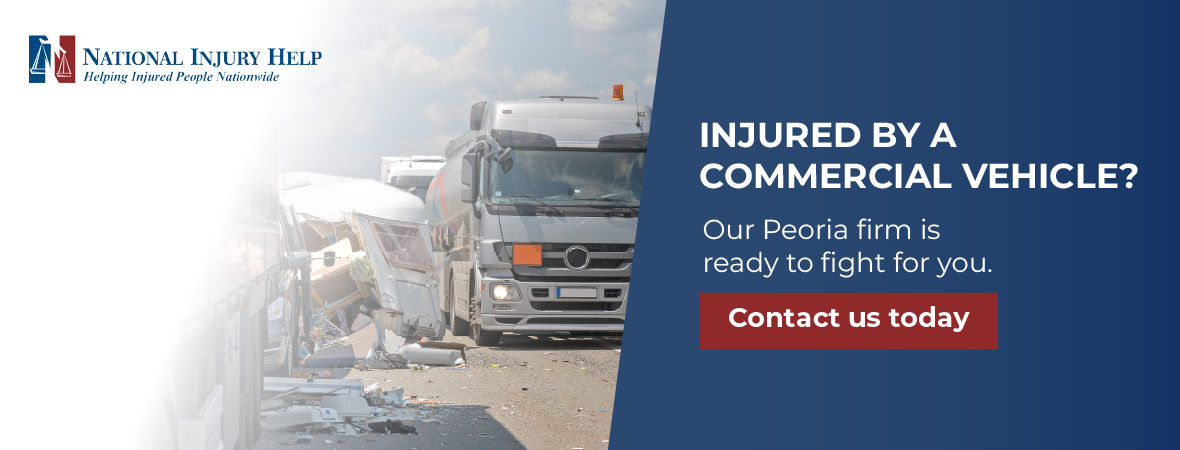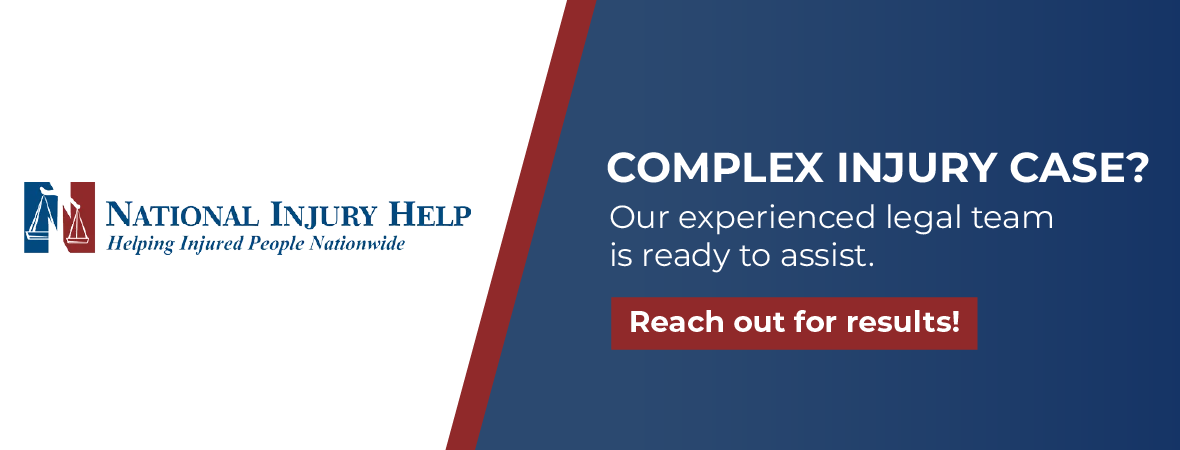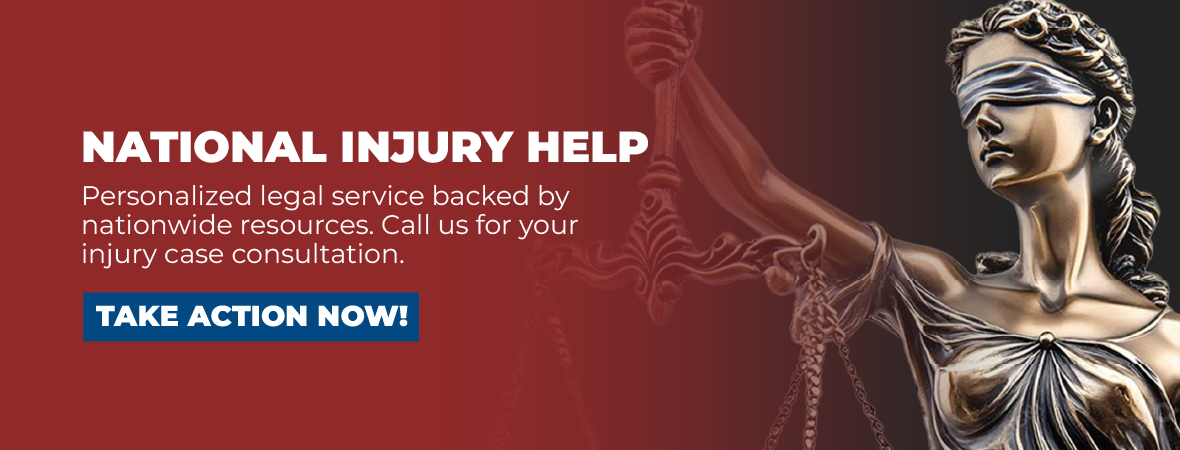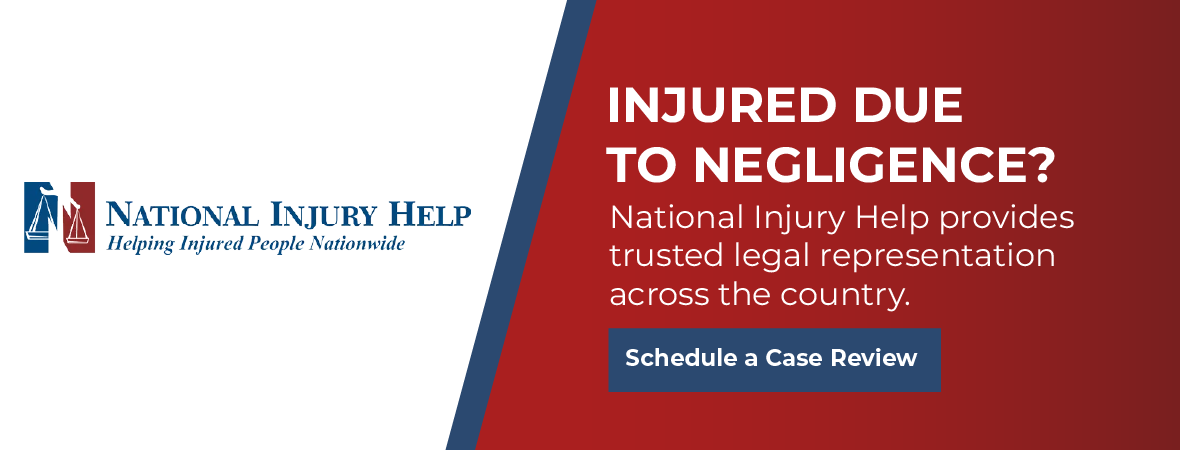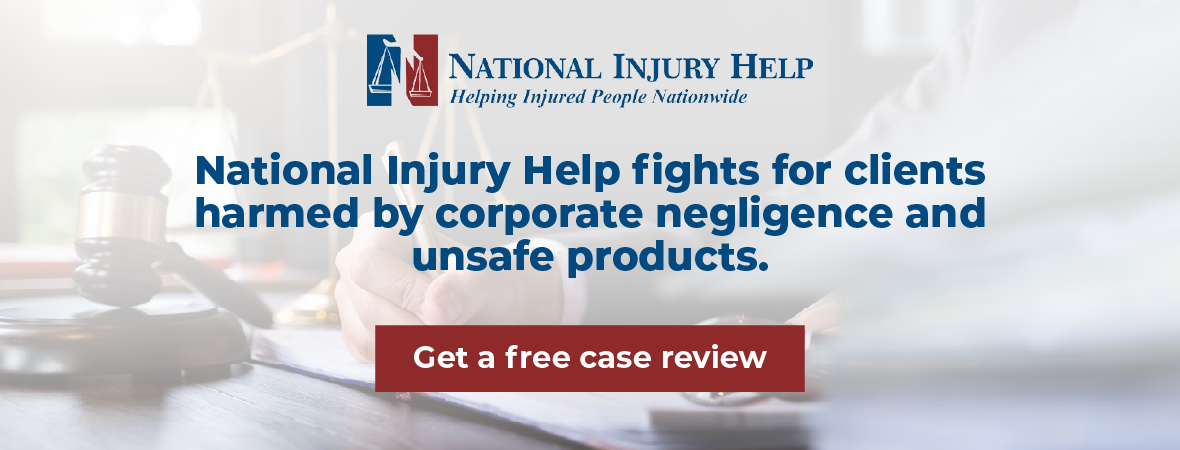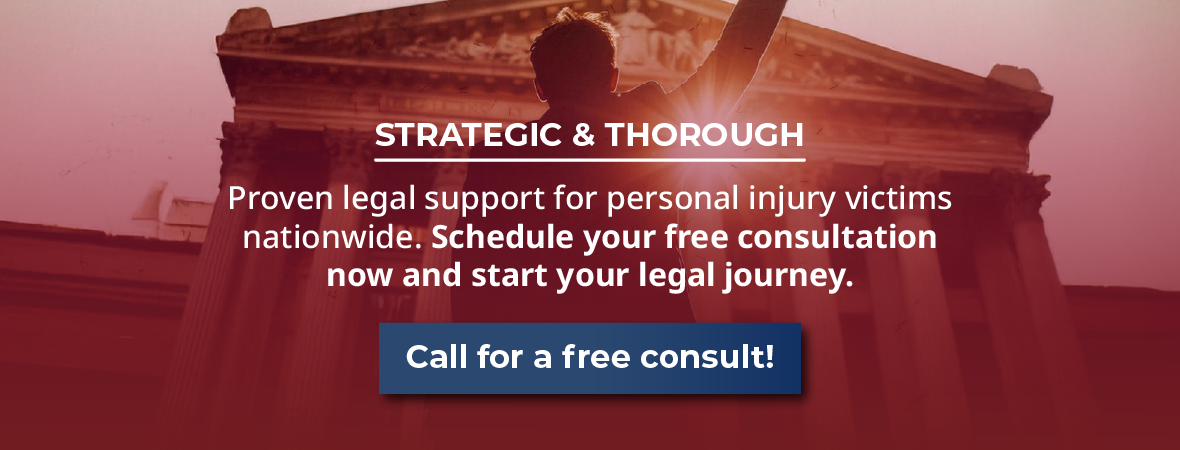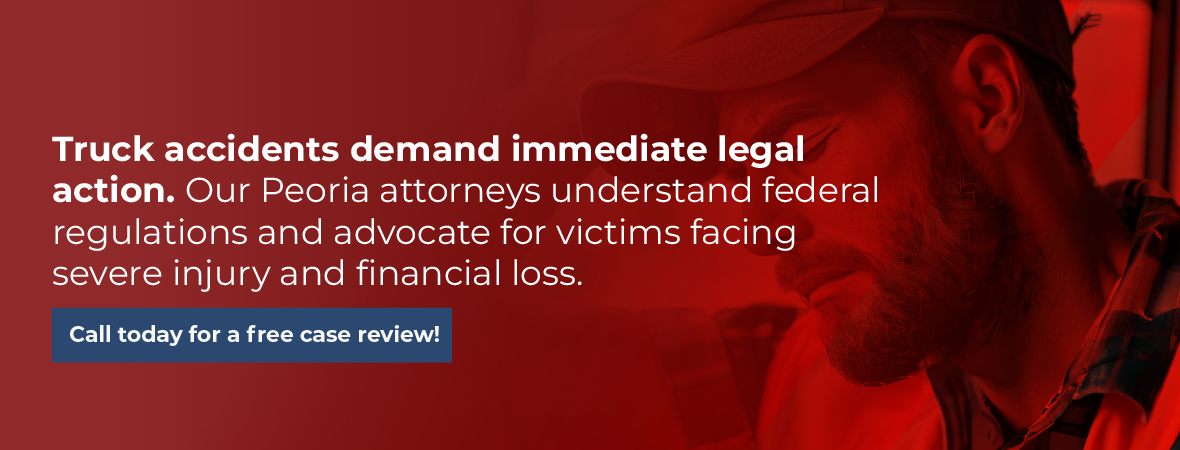Truck accidents in Peoria can cause serious injuries and bring complex legal challenges. Contact our team at National Injury Help by calling 1 (800) 214-1010 today.
Heavy tractor-trailers and delivery rigs move through Peoria on Loop 101, Grand Avenue, and the I-17 corridor every year. These vehicles carry thousands of pounds of freight, and the results can be catastrophic when something goes wrong. Cars crumple, occupants suffer traumatic injuries, and families lose the sense of security they once took for granted.
Victims face towering medical bills, rehabilitation sessions that last for months, and the emotional strain of watching life plans stall. While drivers and passengers struggle to recover, trucking companies hire defense teams and insurance adjusters who work to minimize payouts. A Peoria truck accident lawyer levels that field by gathering evidence, applying state and federal regulations, and demanding full compensation for every dollar lost.
We are here to protect your rights and guide you through every step of the process.
What Makes Truck Accidents Different From Car Crashes
A collision between two cars often involves manageable repair bills and injuries that heal within weeks. A crash with an eighty-thousand-pound tractor-trailer brings an entirely different scale of danger, damage, and legal complexity.
Size and Weight Disparities
A loaded semi can weigh twenty times as much as a family sedan.
That extra mass translates to longer stopping distances and much stronger impact forces. Even a low-speed rear-end crash can fracture bones, crush door frames, and push multiple vehicles into a chain reaction.
Federal and State Trucking Regulations
Truck drivers operate under rules from the Federal Motor Carrier Safety Administration, which set strict limits on driving hours, mandate electronic logbooks, and require routine drug testing.
Arizona adopts many of these rules and adds state-specific safety standards. Proving a violation often unlocks substantial leverage against the company.
Multiple Parties May Be Liable
Unlike an ordinary accident where only two drivers exchange information, a truck case may involve the driver, the trucking company, a freight broker, a maintenance contractor, and even the manufacturer of a defective brake system. Each party carries its own insurance policy, and each policy adds a layer of negotiation.
Commercial Insurance Policies
Federal law requires trucks that cross state lines to carry policies with up to a million dollars or more in liability coverage. Those high limits encourage insurers to mount aggressive defenses. They sometimes send rapid-response teams to the scene within hours to gather data favorable to the company.
Evidence Can Be Time-Sensitive
Modern rigs store speed, brake pressure, and steering data in electronic control modules, often called black boxes. Companies may overwrite that data after a short cycle unless a legal letter demands preservation. Dash camera footage, shipping records, and driver logbooks can also vanish if an attorney does not secure them quickly.
Common Causes of Truck Accidents in Peoria
Local highways carry freight to and from Phoenix, Las Vegas, and Southern California. That constant flow can create tight delivery windows, crowded lanes, and mechanical stress on vehicles.
Driver Fatigue and Hours-of-Service Violations
Long miles and overnight deadlines tempt drivers to exceed federal limits. Electronic logs help, but falsified entries still occur. Fatigue slows reaction time, narrows peripheral vision, and turns a momentary lapse into a life-changing impact.
Distracted or Impaired Driving
Smartphones buzz with dispatch messages. GPS tablets flash directions. Even a quick glance away from the road can hide a stopped car. Alcohol, prescription medication, or illicit drugs amplify danger, especially when combined with a forty-ton rig.
Poor Truck Maintenance
Worn brake pads, under-inflated tires, or cracked air lines reduce stopping power. Small defects may pass a quick inspection yet fail under real-world stress on Loop 101. Maintenance logs often reveal skipped service intervals that point to negligence.
Overloaded or Improperly Secured Cargo
When freight companies exceed weight limits or load pallets unevenly, the center of gravity rises. An abrupt lane change can trigger a rollover or jackknife that blocks every lane of traffic. Loose cargo may break through trailer doors and hit following cars.
Reckless or Aggressive Driving
Pressure to reach the next drop-off leads some drivers to speed, tailgate, or weave between lanes near Bell Road exits. Aggressive tactics shorten the margin for error and magnify the harm when something goes wrong.
Peoria Truck Accident Lawyer Explains The Matter of Liability
Unlike a simple rear-end accident between two passenger vehicles, commercial truck crashes involve several layers of responsibility. There’s the driver behind the wheel, of course. But there’s also the company that owns the truck, the shop that maintains it, the team that loads the cargo, and even the manufacturer of the truck’s parts. In some cases, poor road conditions or missing signage may even bring a government agency into the picture.
The Truck Driver
The most obvious place to start is with the person operating the vehicle. Truck drivers have a legal duty to drive safely, remain alert, and follow both state traffic laws and federal trucking regulations. When they fail to meet this duty, they can be held directly responsible for the harm they cause.
Some examples of driver negligence include:
- Speeding, especially in bad weather or on curves
- Driving while distracted, such as using a phone or GPS
- Operating under the influence of alcohol, drugs, or prescription medication
- Falling asleep at the wheel due to skipped rest breaks
- Ignoring weight limits or tailgating smaller vehicles
Evidence that supports a claim against the driver may include dashcam footage, police reports, eyewitness statements, or data pulled from the truck’s onboard systems (such as the electronic logging device).
The Trucking Company
Truck drivers don’t usually operate independently. Most work for companies that own the trucks, schedule the routes, and set the policies. When a company pushes its drivers to meet unrealistic delivery times, ignores safety concerns, or skips proper training, it may share legal liability.
Trucking companies can be held responsible under two major legal theories:
- Vicarious liability, which means the company is liable for the driver’s negligence because the driver was acting as its employee.
- Direct negligence which applies when the company’s own actions or policies contributed to the crash.
Examples of direct negligence by trucking companies include:
- Hiring unqualified drivers or skipping background checks
- Failing to perform regular drug or alcohol testing
- Pressuring drivers to falsify rest logs or exceed legal hours of service
- Ignoring safety recalls or delaying needed maintenance
- Skipping routine inspections of tires, brakes, and lights
If company records show a pattern of ignoring safety violations or pushing profits over compliance, that information can make a strong case for corporate fault.
The Vehicle or Parts Manufacturer
Sometimes, a truck is operated correctly, but it still crashes due to a mechanical failure. When a defective part plays a role in the accident, the company that made or designed the part may be held strictly liable for injuries and damages.
This type of liability, called product liability, doesn’t require proving negligence. If the part was defective and that defect caused or worsened the crash, the manufacturer may owe compensation.
Common vehicle defects in truck accident cases include:
- Brake failures
- Malfunctioning steering systems
- Faulty tires or tire blowouts
- Defective trailer hitches or coupling devices
- Lighting or signal malfunctions
In these cases, attorneys often bring in mechanical engineers to inspect the truck, trace the defect, and compare it to the part’s design or manufacturing history.
Maintenance or Loading Contractors
Trucking companies often outsource important responsibilities like vehicle maintenance or cargo loading. These third-party contractors may seem separate, but their mistakes can directly cause crashes or make injuries worse.
Examples of maintenance-related negligence include:
- Failing to inspect or replace worn brake pads
- Using the wrong tire type or failing to tighten lug nuts
- Skipping routine fluid checks or filter replacements
Loading contractors can also contribute to crashes by:
- Overloading trailers beyond legal weight limits
- Failing to secure cargo properly
- Distributing weight unevenly, which can increase the risk of rollovers or jackknife accidents
If investigators discover that poor maintenance or improper loading played a role, the contractors may face liability alongside the driver and trucking company. Contracts and inspection records usually help determine who had what duty and whether they failed to meet it.
Government Agencies (In Rare Cases)
Most crashes are caused by driver error or vehicle failure, but poor road conditions sometimes add a hidden layer of danger. If the government entity responsible for road design, maintenance, or signage failed to keep the area safe, it may share in the blame.
Examples of government-related liability include:
- Faded or missing lane markings
- Poorly placed or absent warning signs
- Malfunctioning traffic lights or signals
- Potholes, debris, or unmarked construction zones
- Dangerous road designs with poor drainage or visibility
Suing a government agency is more difficult than suing a private company. In Arizona, for example, strict notice-of-claim deadlines apply. You usually have only 180 days from the date of the incident to file a formal claim with the responsible city, county, or state agency. If that deadline passes, your case could be dismissed, even if the evidence is strong.
Why It Matters to Identify All Liable Parties
Truck accidents often result in serious injuries, and a single insurance policy may not offer enough coverage to meet your financial needs. By identifying every party that shares fault, your attorney can access multiple policies and increase the total compensation available.
For example:
- The truck driver may carry $100,000 in personal liability insurance.
- The trucking company may have a $1 million commercial policy.
- The parts manufacturer or maintenance provider may hold additional coverage.
A careful investigation into all potential defendants strengthens your case, expands your options, and puts pressure on insurers to settle fairly.
Peoria Truck Accident Lawyer Explains Arizona Trucking Laws That Could Affect Your Claim
When a commercial truck crash occurs, it’s not just a matter of who hit whom. The legal rules behind trucking accidents are more complex than those in regular car collisions. In Arizona, both state and federal laws apply. These rules shape how insurance claims are handled, how fault is assigned, and what kind of compensation you can receive.
Comparative Negligence in Arizona
Arizona follows a pure comparative negligence system. This means that even if you were partly to blame for the accident, you can still recover compensation. However, your final payout will be reduced by the percentage of fault assigned to you.
For example, let’s say a jury decides you were 20 percent at fault for the crash, maybe because you were slightly speeding or failed to signal. If your total damages amount to $100,000, you would still receive $80,000 after the 20 percent reduction.
Why does this matter? Because trucking companies and their insurers will almost always try to shift some of the blame to you. They know that reducing your share of the blame by even 10 or 15 percent can save them thousands of dollars.
Your attorney’s job is to gather evidence that minimizes your share of the blame. Dashcam footage, witness statements, black box data, and accident reconstructions all help paint a clear picture that supports your version of events.
Arizona’s Statute of Limitations for Truck Accidents
Legal deadlines can make or break your case. In Arizona, you generally have two years from the date of the crash to file a personal injury lawsuit. If you miss this deadline, the court will likely dismiss your case, no matter how strong your evidence is.
There are a few exceptions to this rule. If a government entity is involved, such as a city-owned truck or poor road maintenance that contributed to the crash, you may face a much shorter deadline. In these cases, you may need to file a notice of claim within 180 days.
Getting legal help early ensures that critical deadlines are met. It also allows your legal team to start preserving evidence right away. In trucking cases, that’s vital, because key data like electronic logs, maintenance records, and dashcam footage can be lost or deleted within weeks if no one acts to secure them.
FMCSA Regulations and How They Affect Your Claim
The Federal Motor Carrier Safety Administration (FMCSA) sets national safety standards for all trucks that operate across state lines. Even if your crash happened on a state road in Arizona, these rules still apply to most commercial trucking companies.
FMCSA rules cover a wide range of safety issues, including:
- Hours of Service (HOS): Truck drivers must follow strict limits on how long they can drive without rest. Violating these rules can lead to fatigue-related crashes.
- Drug and Alcohol Testing: Drivers must pass random drug and alcohol tests. If a driver tests positive or skips a required test, it can be strong evidence of negligence.
- Vehicle Maintenance: Trucks must be inspected regularly, and any worn or defective parts must be repaired or replaced immediately.
- Logbooks and Recordkeeping: Drivers and companies must keep detailed records of drive time, rest breaks, maintenance, and inspections.
When a truck driver or company violates FMCSA rules, that violation can be used as evidence in your case. It shows that the company failed to follow national safety standards, something that juries often view as serious misconduct.
For instance, if the truck driver had been on the road for 16 hours straight in violation of HOS rules and then rear-ended your car, that violation could tip the case in your favor. It strengthens your claim and can lead to a higher settlement or court award.
Arizona’s State-Specific Trucking Laws
While FMCSA rules apply nationally, Arizona has its own set of state-level laws that govern commercial trucking. These rules are enforced by the Arizona Department of Transportation (ADOT) and include additional safety and insurance requirements.
Here are a few state-specific rules that could impact your case:
Intrastate Operating Rules
Not all trucks in Arizona travel across state lines. Some operate only within the state. These “intrastate” carriers must still comply with Arizona’s version of federal rules. If they fail to do so, by ignoring rest limits or skipping inspections, they can be held liable for violating state trucking law.
Weight Limits
Arizona sets maximum weight limits for different types of roads and bridges. Trucks that exceed these limits are harder to stop and more likely to cause severe damage. If the truck in your crash was overloaded, it may be in violation of state law. That alone can help establish liability.
Required Insurance Coverage
Arizona requires commercial trucking companies to carry much higher levels of liability insurance than regular drivers. These policies typically start at $750,000 and go into the millions for larger or more hazardous vehicles.
This matters because higher insurance limits mean more money is available to cover your medical bills, lost wages, and other losses. However, accessing that money requires proving that the trucking company or driver was at fault.
If they violated state safety laws, such as driving with faulty brakes or skipping required inspections, it can be easier to make your case.
Why These Laws Matter to Your Claim
Trucking laws create the foundation of every injury claim involving an 18-wheeler, delivery truck, or other commercial vehicle. Violations of these laws not only show that the driver or company acted carelessly, but they also shift the legal burden in your favor.
Let’s say your lawyer proves that:
- The driver exceeded FMCSA hours-of-service limits
- The truck was overloaded, violating Arizona weight rules
- The company failed to conduct a background check before hiring the driver
Each of these violations creates a stronger argument that the defendant was negligent. And when multiple violations stack up, the pressure on the trucking company and its insurer to settle fairly increases significantly.
Common Injuries in Truck Accidents
The human body is not built to withstand the forces unleashed when metal outweighs it by tens of thousands of pounds.
Traumatic Brain Injuries
A sudden stop can whip the head forward and back, causing bruising or tearing of brain tissue. Cognitive problems, memory gaps, and mood changes can follow.
Spinal Cord Injuries and Paralysis
Fractured vertebrae or severed nerves may leave victims with partial or complete loss of movement, sensation, or both. Wheelchair ramps, vehicle lifts, and personal assistance become daily needs.
Multiple Fractures and Crush Injuries
Smaller cars can buckle under tractor-trailers. Drivers and passengers may suffer broken arms, legs, hips, or ribs, sometimes requiring multiple surgeries and metal hardware.
Internal Bleeding and Organ Damage
Seat belts and airbags reduce some harm but cannot prevent every blow. Bleeding in the abdomen or chest can go unnoticed at the scene, raising the risk of shock.
Wrongful Death
Tragically, many truck crashes kill drivers, passengers, or pedestrians. Families then face funeral costs, lost household income, and deep emotional loss.
Peoria Truck Accident Lawyer Guide for What to Do After a Truck Accident
Take these steps if you can, or ask a trusted friend or family member to handle them.
Call 911 and Seek Immediate Medical Help
Your health always comes first. Paramedics can stabilize neck injuries, control bleeding, and rush the most critical patients to trauma centers.
Document the Scene
If safe, use your phone to photograph damage, skid marks, license plates, and cargo spills. Try to capture time-stamped images of the driver’s log screen or shipping papers if visible from outside the cab.
File a Police Report
Arizona law requires reporting when injuries or significant property damage occur. Officers record statements, issue citations, and often note potential hours-of-service violations.
Notify Your Insurance Provider
Give basic facts, not opinions. Avoid detailed discussions with the trucking company’s insurer until you have legal representation because your words can be used against you.
Contact a Peoria Truck Accident Lawyer
Trucking firms may deploy investigators within hours. Your lawyer balances that speed by sending preservation letters to protect black box data and company records.
Types of Compensation Our Team of Experienced Peoria Truck Accident Lawyers Can Secure for Victims
Money can never erase pain, yet it funds recovery, security, and dignity.
Medical Expenses
Compensation includes ambulance rides, emergency surgery, hospital stays, medication, physical therapy, mobility aids, and future procedures your doctor predicts.
Lost Wages and Future Earning Capacity
Time away from work drains finances. If injuries end a career or force a lower-paying role, the difference between old and new earnings belongs in the claim.
Pain and Suffering
Physical pain, sleepless nights, anxiety, and loss of pleasure in hobbies carry monetary value because they erode quality of life.
Property Damage
Settlements should pay for towing, repairs, or replacement of your vehicle, along with damaged personal items such as phones and laptops.
Punitive Damages
Arizona courts may award extra money when a defendant acts with extreme disregard for safety, for instance, when a trucking company orders drivers to falsify logs or ignore brake failures.
How a Peoria Truck Accident Lawyer Builds a Winning Case
An attorney guides the process from the first call to the final payment.
Collect and Preserve Crucial Evidence
We obtain electronic control module data, maintenance sheets, driver qualification files, dispatch emails, and dash camera footage before they disappear or get altered.
Work With Accident Reconstruction Experts
Engineers analyze skid marks, road grades, and vehicle weights to recreate the crash. Animated models help insurers or jurors see exactly how the collision unfolded.
Deal With Aggressive Insurance Companies
Experience teaches which tactics adjusters use to cut payouts. We counter with documented facts, medical proof, and the willingness to file suit if talks stall.
Fight for Maximum Settlement or Go to Trial
Many cases end at the negotiation table. When carriers refuse fair offers, we file in the Maricopa County Superior Court, conduct depositions, and present your story before a jury.
No-Win, No-Fee Representation
You pay no attorney’s fee unless we secure money for you. We advance costs for experts and filings, recovering them from the final award.
Talk to a Peoria Truck Accident Attorney Today
Truck accidents are different from typical car crashes. The size and weight of a commercial truck can cause devastating injuries, especially when safety rules are ignored. If you or a loved one was hurt in a Peoria truck crash, now is the time to act. At National Injury Help, we are ready to fight for your recovery.
Trucking companies and their insurers often move fast to protect themselves. Their teams may already be collecting black box data, interviewing their drivers, and building a defense. That is why it is important to get legal help as soon as possible. Our attorneys know how to gather the same evidence quickly and preserve it before it disappears.
We will review logbooks, maintenance records, driver history, and footage from nearby cameras. We also work with accident reconstruction experts and medical professionals to build a strong case that clearly shows how the crash happened and what it cost you.
Whether you are dealing with hospital bills, lost wages, or ongoing treatment, you should not have to cover those costs alone. Our firm offers free consultations, and you will not pay any legal fees unless we win your case.
We proudly serve the entire Peoria area, including communities near the Loop 101, Grand Avenue, and Bell Road. If a negligent truck driver or company caused your injuries, let us help you hold them accountable.
Call 1-800-214-1010 today to speak with a semi-truck crash attorney in Peoria. We are here to answer your questions, explain your rights, and begin building the case that gets you the compensation you deserve.
Frequently Asked Questions (FAQ) for Truck Accident Victims in Peoria, Arizona
What should I do immediately after a truck accident in Peoria?
Your health is the top priority. Call 911 for medical help and to file a police report. If you are able, document the scene with photos of the vehicles, skid marks, and any visible cargo. Avoid giving detailed statements to the trucking company’s insurance adjuster. Contact a Peoria truck accident lawyer as soon as possible to help preserve crucial evidence.
Why are truck accidents different from regular car accidents?
Truck accidents involve much greater force due to the massive size and weight of commercial trucks, often leading to more severe injuries. They are also governed by complex federal and state regulations, and multiple parties like the driver, trucking company, or maintenance contractors can be held liable. Evidence, such as data from the truck’s “black box,” can be lost quickly if not preserved.
Who can be held responsible for a truck accident in Arizona?
Liability is not limited to just the driver. Depending on the circumstances, responsible parties can include the truck driver (for negligence like fatigue or distraction), the trucking company (for poor hiring practices or pressuring drivers to violate hours-of-service rules), maintenance contractors, parts manufacturers (for defective equipment), or even government agencies in rare cases involving dangerous road conditions.
What is the time limit to file a truck accident lawsuit in Arizona?
In Arizona, you generally have two years from the date of the accident to file a personal injury lawsuit. This is known as the statute of limitations. If a government entity is involved, you may need to file a notice of claim within 180 days. Missing these deadlines can bar you from recovering compensation.
What if I was partly at fault for the accident?
Arizona follows a “pure comparative negligence” rule. This means you can still recover compensation even if you were partially to blame. However, your final settlement or award will be reduced by your percentage of fault. For example, if you are found 10% at fault, your compensation will be reduced by 10%.
What kind of compensation can I recover?
Victims may be entitled to compensation for medical expenses (past and future), lost wages, loss of future earning capacity, pain and suffering, and property damage. In cases involving extreme negligence, such as a company knowingly allowing a driver to violate safety rules, punitive damages may also be available.
How can a Peoria truck accident lawyer help me?
A lawyer handles the complex legal and investigative work. This includes sending preservation letters to secure evidence like electronic logs and black box data, working with accident reconstruction experts, dealing with aggressive insurance companies, and building a strong case to fight for a full settlement or take your case to trial if necessary.
How much does it cost to hire a truck accident lawyer?
At National Injury Help, we work on a contingency fee basis, often called “no-win, no-fee.” This means you pay no attorney fees unless we successfully recover money for you. We advance the costs of the case and are reimbursed from the final settlement or award.
What are common causes of truck accidents on Peoria roads like Loop 101 and Grand Avenue?
Common causes include driver fatigue from violating federal hours-of-service rules, distracted driving, improper truck maintenance, overloaded or unsecured cargo, and aggressive driving due to tight delivery schedules. These factors are especially dangerous on busy local highways.





